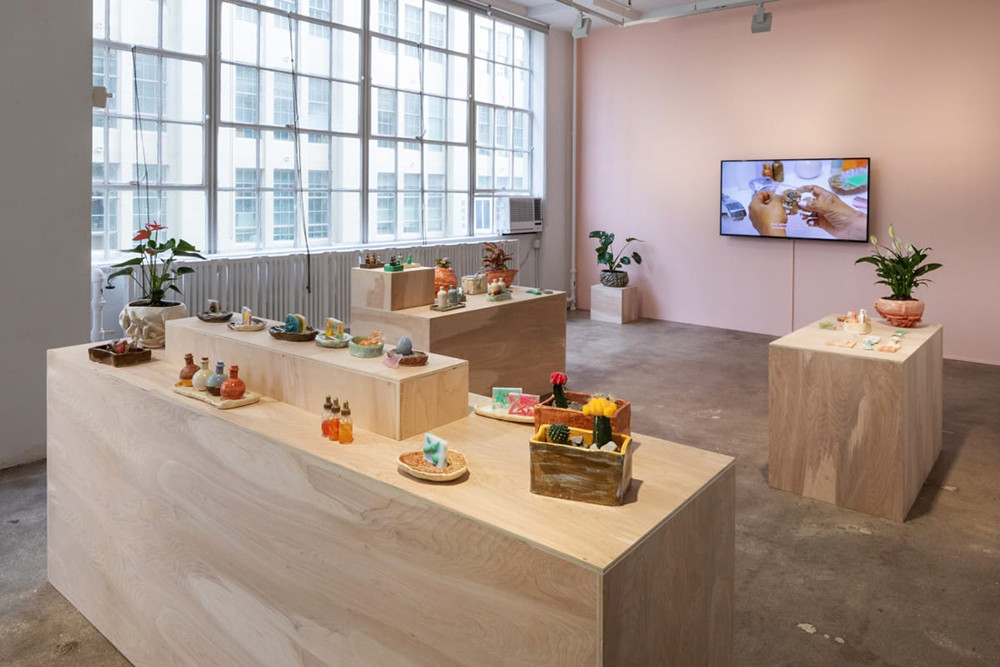[ad_1]
Ilana Harris-Babou’s videos typically lampoon aspirational lifestyle trends associated with privileged consumer demographics, adopting the forms of instructional how-tos or brand promos—complete with soundtracks of generically upbeat music—on subjects like basement renovations, the “erotics” of cooking, and fictional product lines that betray histories of racial oppression. The home-furnishing store Restoration Hardware figured in two videos she contributed to last year’s Whitney Biennial. One of them, Human Design (2019), was inspired by an experience she had involving African wood carvings displayed at the company’s Manhattan flagship. Speaking with Document magazine, the artist mentioned that when she inquired about the carvings’ source, a sales associate replied, “We send team members out across the globe to find these one-of-a-kind objects,” and explained that they weren’t for sale. In other words, they were exotic curios from Africa used to enliven an otherwise staid retail space catering to upscale, largely white tastes. Pushing the situation to its humorous breaking point, Harris-Babou cast herself as CEO of a fictional interior design company who travels to Senegal to find her aesthetic roots for the benefit of her high-end clientele.
For “Decision Fatigue,” her recent exhibition at Hesse Flatow, Harris-Babou turned her attention to the wellness industry. In the titular video (all works 2020), her mother, Sheila Harris, plays a self-help guru who touts things like Cheeto face masks, rose quartz facial rollers, and soaps containing junk food like chocolate chips. Sharing her “daily beauty routine” for activities like “not breastfeeding” and “eating a TV dinner,” she offers such illogical steps as washing down a dose of multivitamins with Pepsi and—for the aforementioned, stomach-churning mask—grinding Cheetos with a mortar and pestle into crumbs that can be spread (inefficiently) over the skin. Her processes take the dictum “You are what you eat” to the hysterical extreme by combining beauty products with the foodstuffs that make up many Americans’ diets. Of course, as with all of Harris-Babou’s work, there is a biting critique in this presentation, which highlights the absurdity of health and beauty standards that many people don’t have the resources or time to maintain.
The video’s snack food and as-seen-on-TV gimmicks manifested in three-dimensional form in the gallery—as grotesque objects set on shelves and pedestals. An array of soaps was on display, including fake ones comprising resin bars with Cheetos, car air fresheners, and a flower suspended in them, as well as more proper, glycerin-based versions that emitted a treacly fragrance. The facial roller was a motif in various works, including Plant 4—a cacti-holding planter whose ceramic surfaces bear casts of the trendy beauty tool. Plant 5 is a ceramic pot embellished with casts of nail polish bottles and containing a Monstera deliciosa, or Swiss cheese plant—a signifier of a certain kind of eclectic, hip taste ubiquitous on Instagram. A group of paper collages, meanwhile, turned the orderly staging of store catalogues into nightmarish clutter. In Tub, for instance, cream-colored, coolly Brutalist-style bathtubs overlap in a suffocating mass. With deadpan humor, Harris-Babou skillfully transforms such objects of desire into monstrous manifestations of money and power.
[ad_2]
Source link


